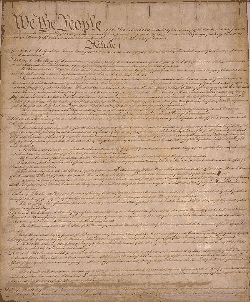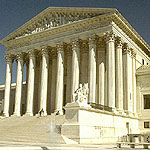|
I find the study of constitutional law to be immensely interesting. It concerns some of the most fundamental questions about the nature of our government and our society. In its text and caselaw, constitutional law reveals the path of our history, from the drafting of the Constitution in 1787 through the adoption of the important 13th, 14th, and 15th amendments following the Civil War, through the desegregation battles of the 1950s and 1960s, to our confrontation of the perplexing issues of today such as regulation of the Internet and euthanasia. Constitutional law, it its baffling complexity, is a reflection of our deepest values, our political conflict, and our nation's moral trajectory. I understand, however, from years of teaching that constitutional law is not every student's cup of tea. Some students become frustrated with its "fuzziness." Yes, it is fuzzy--and one cannot take a clear picture of a fuzzy object. There are relatively few clear answers in constitutional law (and those that are clear--e.g., "Can a 27-year-old be elected President?"--tend not to be very significant to lawyers). The indefiniteness of constitutional law is a function of many things, including: (1) a text that is the product of long gone eras, (2) a text that in many cases (e.g, "due process of law," "equal protection of the laws") was intentionally vague to accomodate the needs of a changing society, and (3) important (and often emotional) issues that tend to bring the values and politics of judges into play more than in other areas of law, where judges are more likely to think of their judging as an intellectual exercise or puzzle. To students
looking for
clear rules, I say, "Stop looking." What is important is to
understand
is not so much answers as it is approaches and questions. Learn
the
sources that judges might rely upon to guide their constitutional
interpretation
(text of Constitution, intentions of framers, case precedent, policy
consequences
of alternative interpretations). Learn how judges are likely to
weigh
these various guides in various contexts. Understand historical
trends
and understand that judges are ultimately affected by the same economic
and social forces as society as a whole. With a solid knowledge
of
these things, students will be able to make intelligent and potentially
convincing arguments--and make reasonable predictions about the
likelihood
of their arguments being successful in an actual case involving the
same
issues. History of the
Constitution
|
 Constitution of the United States
Additional Questions for Class Discussion 2. How is constitutional law different from statutory law, administrative law, and common law? (Think about differences in how each form of law is made, how it is interpreted, how it might be changed, and what subject matter it is likely to cover.) A 3. What benefits come from a nation having a written constitution? A 4. Are there disadvantages in having a written constitution such as ours? If so, what might they be? A Supreme Court
|


